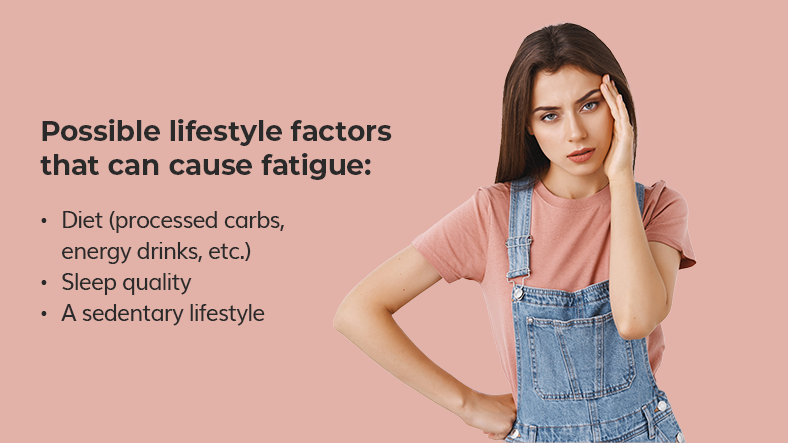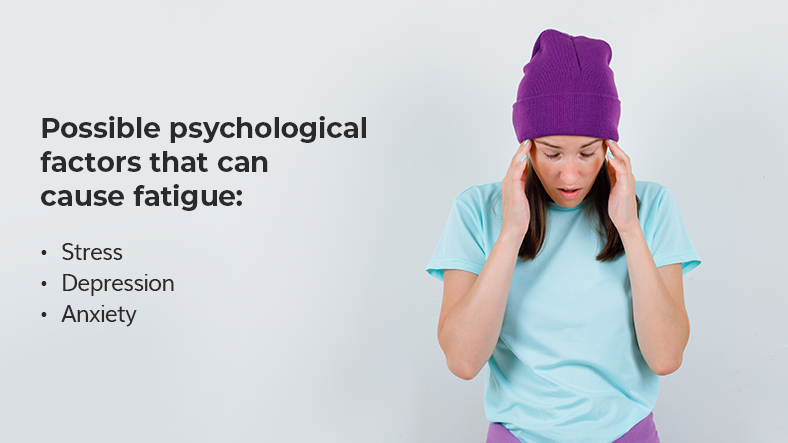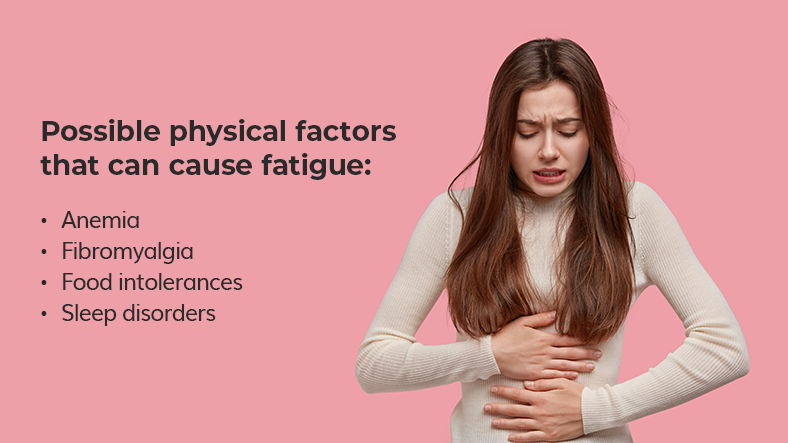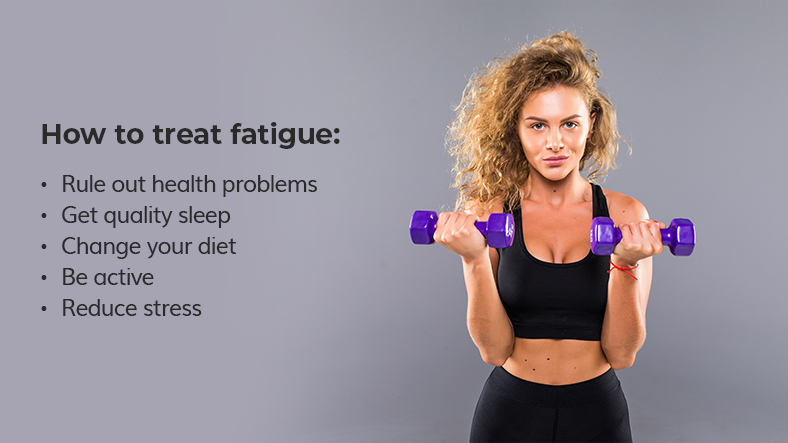Possible Reasons Why You Always Feel Tired

Feeling tired all the time can be miserable, and it can take away from your ability to enjoy life! In this article, I’ll share some of the most common reasons people feel fatigued and talk about things you can do to improve your energy levels.
What Is Fatigue
Everybody gets tired sometimes, especially after a busy weekend, a rough night of sleep, or while feeling sick. Feeling tired occasionally is expected. However, feeling like you are regularly sleepy, unable to complete your daily tasks, or even like you can’t think properly because of your exhaustion is considered fatigue. People who experience fatigue aren’t just sleepy. They typically lack motivation too.
Sleepiness is typically a short-term problem. You might feel tired after a few bad nights of sleep, and then recover shortly afterward. Fatigue typically lasts for longer than this, or it comes back repeatedly. People don’t always know why they are experiencing fatigue.
A person can experience physical fatigue or mental fatigue, but these two types of fatigue often go together. When somebody is regularly tired physically, they tend to become emotionally and mentally drained too.
Somebody with physical fatigue might:
- Struggle to do daily physical tasks they normally do easily, like taking a walk or going up the stairs
- Feel like their muscles are weaker than normal
Somebody with mental fatigue might:
- Have trouble focusing on one thing at a time.
- Get distracted easily.
- Have trouble staying awake while working.

Possible Causes of Fatigue
One of the challenging things about fatigue is that there are a lot of possible causes for it. Some people have trouble narrowing down why they feel the way they do. Many people will also find that multiple factors contribute to their fatigue.
Lifestyle Factor
Lifestyle factors, like what you eat and your activity levels, make a big difference in how you feel! Many people notice that they have more energy and feel more alert when they eat well, get plenty of sleep, and maintain an active lifestyle.
Diet
If you regularly feel tired or sluggish, I recommend taking a look at your diet. Make sure you are eating plenty of vegetables, lean protein, good quality fats, and whole grains. I like to try to eat foods that are minimally processed too.
Although you should make sure you’re eating a well-balanced diet, I also suggest taking a look at a few specific elements of your diet.
Eating too many refined carbohydrates throughout the day can make you feel very tired. When you eat refined carbs, your body processes them right away, and your blood sugar is elevated quickly. This means that you get a short boost of energy. Unfortunately, your body also crashes quickly, making you feel tired. Some common refined carbs include:
- White bread and pasta
- Most breakfast cereals
- Potato chips and similar snacks
Instead of eating refined carbs, consider eating a carbohydrate that has plenty of fiber, like some form of vegetable.
Energy drinks are another diet-related item that you should reconsider if you constantly feel tired. Like refined carbs, these drinks typically provide people with a quick boost of energy and then a crash due to the combination of caffeine and sugar.
Energy drinks can also make it harder to sleep at night, making you even more tired the next day. If you can help it, try drinking coffee in the morning so that it is less likely to interfere with your sleep schedule. :)
Finally, if you’re constantly feeling tired, I suggest looking at how much you’re eating. People who aren’t eating enough calories often feel very fatigued. Eating too few calories can mean you’re not getting the energy your body needs to function, and you also might be missing out on essential vitamins that help manage energy levels.
How many calories you need depends on your age, height, goals, and activity level, but everybody should be eating at least 1,200 calories.
RELATED POST: How to Have a Healthy Relationship With Food
Sleep
Sleep is so important! Most adults need anywhere from 7-9 hours of quality sleep every night. If you struggle to get quality sleep:
- Go to bed and wake up at the same time every day.
- Make your room as quiet and comfortable as possible.
- Try not to exercise or watch a lot of TV before bed. Both of these things can wake you up even more.
- Turn your phone off about 30 minutes before you go to sleep.
- Avoid tobacco and alcohol before bed.
- Skip long naps. It’s best to get your sleep in all at once during the night.
Sleeping during the day, instead of at night, can also contribute to fatigue. This is true even if you are still getting 7-9 hours. People who work nights are more likely to experience fatigue. If you can, try to sleep during the nighttime as much as possible!
RELATED POST: What Happens to Your Body When You Don’t Sleep
A Sedentary Lifestyle
When you’re tired, all you want to do is rest! But sometimes resting in bed is the last thing your body needs. Although rest is essential, so is living an active lifestyle. Studies suggest that people who exercise have more energy than those who don’t, and a 20-minute workout provides more energy than resting at home.
If you experience a lot of fatigue, consider adding moderate workouts (even walks!) to your daily routine several days a week. You can also try to incorporate more activity into your everyday life. For example, consider:
- Walking to the grocery store instead of driving
- Standing, instead of sitting
- Taking the stairs, not the elevator

Psychological Factors
Mental health and your emotional state can make a huge impact on your body! If you’re constantly feeling tired, consider checking in with how you are doing mentally.
Stress
Stress is a normal part of life, and most people experience some stress on and off. However, people who experience stressful situations regularly are more likely to feel tired.
When you’re stressed, your body produces “flight-or-fight” chemicals that are meant to help you prepare for a disaster. Over time, this can be exhausting!
Stress often causes headaches and muscle tension in addition to fatigue.
RELATED POST: Is Stress Causing Your Weight Gain?
Depression
People who experience depression often have lower levels of the chemical serotonin. Serotonin helps manage your body’s internal rhythms, including when you fall asleep and when you wake up.
When somebody is depressed, they often feel like they lack the motivation to do the things they normally enjoy doing. They might feel tired and lethargic too. Sometimes, people with depression have a hard time falling asleep, and they might wake up early too.
Anxiety
Sometimes, people with anxiety experience a great deal of energy. However, people with long-term anxiety often feel tired all the time. Some symptoms of anxiety include feeling irritable, having a hard time sleeping, feeling worried, being on alert, and constantly feeling like something bad might happen.
When somebody feels anxious, their body often responds physically. They might experience:
- Shaking
- Chest pain
- A quick heart rate
- Trouble breathing
- Muscle tension
- Stomach problems
All of these physical symptoms can be taxing on the body, and it is no surprise that they can make somebody feel worn out.
If you think you might be experiencing depression or anxiety, consider talking with your doctor or mental health professional.
RELATED POST: The Effects of Constant Stress on Your Body

Physical Factors
Illnesses and other physical factors can also cause fatigue. Several different medical conditions can cause fatigue. I’ll discuss a few relevant conditions below, but don’t be afraid to talk to a doctor, even if your symptoms aren’t listed here. :)
Anemia
Anemia is a common blood condition in which your blood doesn’t have enough red blood cells. People who are anemic often experience moderate-to-severe fatigue. Several things can cause anemia, including:
- Stomach and GI problems
- Taking lots of non-steroidal anti-inflammatory drugs, such as ibuprofen
- A lack of iron, folic acid, or Vitamin B12
Women are more likely to be anemic, especially if they have heavy periods. Doctors can test for anemia with simple blood tests. People who are anemic may need to make dietary changes or take iron supplements.
Fibromyalgia
Fibromyalgia is a chronic condition that causes:
- Fatigue
- Muscle pain and tenderness
- Sleep problems
- Difficulty staying alert
The condition has been misunderstood in the past, and doctors are still developing their knowledge on it. Fibromyalgia has similar symptoms to many autoimmune diseases. Genetics, trauma, stress, and past infections can all cause fibromyalgia.
Both men and women can have fibromyalgia, but it is more common in women. People with fibromyalgia often say that they get enough sleep, but it is never restful.
Food Intolerances
Most people know that food intolerances can cause headaches, stomach problems, and rashes. But sometimes we forget that food intolerances and allergies cause fatigue too. Some common food intolerances include soy, gluten, and dairy. I have had my own issues with food intolerances and gut health. One of the symptoms I experienced was lethargy.
If you worry you might have a food intolerance, consider talking to a doctor or trying an elimination diet.
RELATED POST: Dairy Allergy Or Lactose Intolerance – How To Tell The Difference
Sleep Disorders
Sleep disorders are disorders that prevent people from getting restful sleep. There are lots of different sleep disorders, but one of the most common is sleep apnea. This occurs when you don’t get enough oxygen while you sleep, and this prevents you from having a restful night.
Some other sleep disorders include:
- Insomnia: You can’t get to sleep or stay asleep.
- Restless leg syndrome: You feel the desire to move your legs because they are so uncomfortable while you’re trying to fall asleep.
- REM sleep disorder: You talk or walk in your sleep, preventing you from really getting good rest.
Talk to your doctor if you think you have a sleep disorder. They can run tests to track your sleep at night.
Symptoms of Fatigue
Fatigue impacts a person’s daily life. Some of the most common symptoms of fatigue are:
- Sore muscles
- Lack of motivation
- Feeling drowsy during the day
- Headaches
- Moodiness
- Difficulty concentrating
- Blurry vision
- GI problems, such as constipation
- Slowed response time
RELATED POST: How to Stay Motivated

How to Treat Fatigue
Rule out Health Problems
If you have struggled with fatigue for a while, talk to your doctor about it. They can help rule out common health problems that contribute to fatigue. They’ll also help review any medications you take. Sometimes medication can also cause fatigue!
Get Quality Sleep
Make sure you are getting 7-9 hours of sleep every night! Try to go to bed early (making this a habit can be life-changing!) and wake up at the same time every morning. I love having an evening routine to help me wind down at night.
If you need, taking a short afternoon nap can also help energy levels. Napping for too long can keep you from sleeping at night, so be careful.
Change Your Diet
In addition to eating a balanced diet, try to:
- Reduce your sugar intake.
- Eat smaller meals throughout the day.
- Avoid processed foods.
- Drink plenty of water, and eat lots of veggies.
- Only drink caffeine in the morning.
RELATED POST: Are Processed Foods REALLY That Bad for You?
Be Active
Exercise will not only give you extra energy. It will also help you sleep better!
If you don’t exercise but want to try, I suggest ease=ing into it slowly. I love walks, and I think walking is a great way to introduce exercise.
RELATED POST: How Often Should I Exercise To Lose Weight
Reduce Stress
Reducing stress is easier said than done! However, for the sake of your overall wellbeing, it is worth trying! To decrease stress, consider:
- Yoga and meditation
- Trying to identify why you are stressed
- Journaling
- Talking to a loved one or a mental health professional about your stress
- Going for a walk or engaging in some form of physical activity
Experiencing fatigue can make life much more challenging! Addressing it by taking care of your physical, mental, and emotional needs makes all the difference in improving your quality of life. :)
Love Rachael xx






